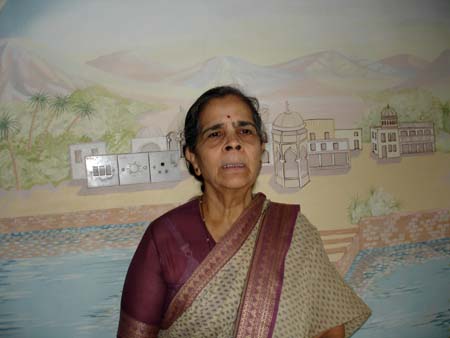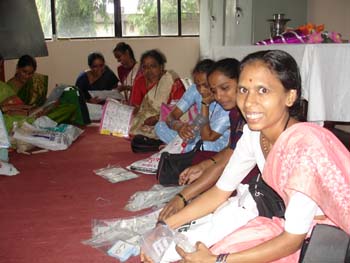Dec 25, 2025
Dec 25, 2025
Nirmala Purandare, 73, recognizes that pre-primary education is no child's play. For the past 25 years, she has been working to reduce the school dropout rate among rural children in Maharashtra by providing teachers' training to semi-literate women.

"Dropout rates in rural schools are high because there are no facilities for pre-primary education. The child enters a government-run primary school at the age of six totally unprepared, and thus rebels against the system or loses interest altogether. The only way to curb the rate of dropouts is to build a literate, healthy and responsible society," Purandare says.
It was with this mind that Purandare started the Vanasthali Rural Development Centre (VRDC) in 1981. The organisation trains rural women with a minimum of eighth or ninth standard education to start their own balwadis (play centers for children) or become teachers in a balwadi. Eventually, they could go on to become trainers as well. VRDC has so far trained more than 10,000 women in all the eight districts of Maharashtra, beginning with the first training programme in Shirur Taluka in 1979.
"We provide training at the taluka level itself, so that the women are not taken away from their family responsibilities. Usually, a group of around 30 women attend the programme and go back to their villages in the evening," she says.
At present, VRDC has 170 balwadis in Maharashtra. Some years back, the number was about 250, but many of these centers - especially the ones in strategic locations - have been taken over by the government under the anganwadi scheme. The government is slowly expanding its area of operations; meanwhile, VRDC runs the other balwadis.
The teachers' training programme syllabus was prepared with assistance from the Pre-Primary Teachers' Training College in Pune, Maharashtra. The usual one-year course duration has been condensed to six months for the convenience of the trainees. The teachers are trained in child psychology, child health, introduction of games, language and educational aids. They are also trained in enlisting the cooperation of local people, so that people support the setting up of a balwadi and send their children to it. Although she is trained as a teacher, a balwadi teacher multitasks, playing a critical role in communicating the importance of education, family planning, nutrition and child care.
The VRDC team has observed that the training programme helps trainees develop confidence and self-esteem. "These women play an important part in helping villagers understand the importance of child education. They are also role models to others in the village - a picture of what education can do for a woman. Balwadi teachers become more confident once they start earning. Even though the income itself is not a big amount, it plays an important part in building their self-esteem," Purandare says.
 Most significantly, women are partners in VRDC's programme. "I had only studied up to class 10 when I joined VRDC. But after I joined, I realized the importance of education and have now completed my M.A in sociology. Initially, my husband did not object, but as I began to get more involved, he was displeased. Through all that, Tai [as Purandare is fondly referred to] supported me and I was able to continue. Now I know that it was only because of my involvement with VRDC that I gained the confidence to support myself after my husband passed away some years back," says Kalpana Gunaki, 46. She has also traveled to France as part of an exchange programme, and also trains teachers at Somatne Phata on Pune-Mumbai Road.
Most significantly, women are partners in VRDC's programme. "I had only studied up to class 10 when I joined VRDC. But after I joined, I realized the importance of education and have now completed my M.A in sociology. Initially, my husband did not object, but as I began to get more involved, he was displeased. Through all that, Tai [as Purandare is fondly referred to] supported me and I was able to continue. Now I know that it was only because of my involvement with VRDC that I gained the confidence to support myself after my husband passed away some years back," says Kalpana Gunaki, 46. She has also traveled to France as part of an exchange programme, and also trains teachers at Somatne Phata on Pune-Mumbai Road.
Nanda Barbhai, 42, speaks about how the teaching programme and working for VRDC turned her life around. "I was married at 15, and it was only because of our association with VRDC that my husband and I decided to have only one child. She is now completing her Ph.D. Now that I am working, I feel I have achieved something in life." Barbhai completed her schooling up to class 12 after the birth of her daughter, and now conducts a teachers' training programme in Pune district.
VRDC supports itself mostly through individual donations. With the money so raised, VRDC gives its teachers a salary of Rs 350 per month - an amount that increases every year.
The organization also publishes a Marathi bi-monthly magazine called 'Vanasthali'. For over six years, women associated with VRDC have been publishing the magazine from their own centers. 'Vanasthali' strives to take essential and up-to-date information - about women's problems, health, nutrition, changing social scenario and values, environment awareness and entertainment - to the doorsteps of rural women.
Besides this, they also conduct vocational courses for women. "We began this new initiative in 2000, training women in candle-making, mehndi, biscuit making and tailoring," says Purandare.
Purandare is also proud of the fact that VRDC now sends its teachers on regular visits to remand homes for juvenile delinquents at Sangamner, Baramati and Shrirampur in order to help school-going internees with their studies. The teachers are also working tribal and Nomadic communities in Latur distict. These children attend government schools, but the VRDC teachers help them with skill development after school (usually 4.30 to 5.30 pm). "By bringing these groups into the ambit of our work, we are expanding the scope of our activities," she says.
But has the dropout rate actually decreased in the past 25 years? "Well, I don't have any statistics on this, but I believe we are on the right track. More and more women approach us for training. Also, in some areas, government schools insist that children go to the balwadi before they start primary school. The women are now more aware of the need for education, and the children themselves are less resistant," she says. A number of the trainees have also taken up jobs in government schools.
(VRDC can be contacted at 318/19-B, Canal Road, Shivaji Nagar, Pune 411016. Phone: +91-20-2565 1550.)
30-Jul-2006
More by : Gagandeep Kaur